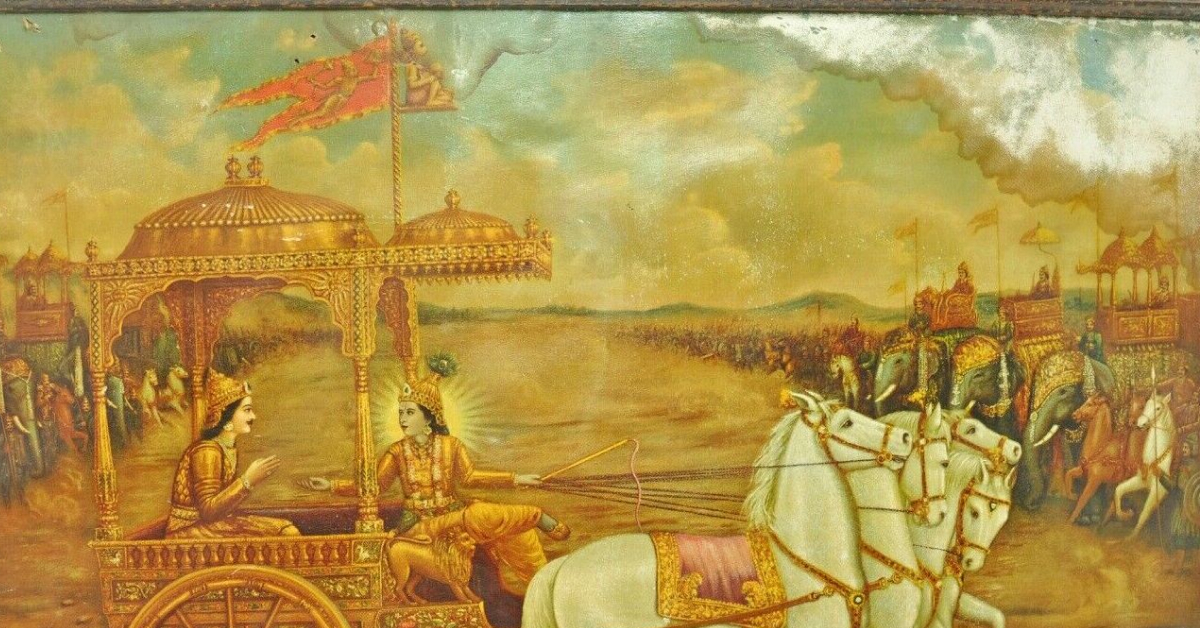Krishna’s Noble Peace Effort
As tensions brewed between the Pandavas and the Kauravas over the rightful claim to the Hastinapura kingdom, the possibility of war became imminent. In a final effort to avoid conflict, Krishna undertook the role of a mediator. His mission was not just a diplomatic exercise but an embodiment of his commitment to dharma and justice.
Krishna approached Duryodhana, the leader of the Kauravas, with a proposal that showcased both fairness and compromise. The Pandavas, despite being entitled to half of the kingdom, were willing to settle for just five villages to avoid bloodshed. This offer was not only reasonable but also a testament to their desire to prioritize peace over vengeance. Krishna’s words were persuasive, logical, and deeply empathetic, highlighting the devastating consequences of war not just for the warring factions but for the kingdom at large.
The Triumph of Ego over Wisdom
Despite the clarity and fairness of Krishna’s proposal, Duryodhana remained unmoved. His response, filled with arrogance and entitlement, reflected his refusal to relinquish even the smallest concession. In his hubris, Duryodhana dismissed Krishna’s plea outright, declaring that he wouldn’t part with land even as small as the head of a needle.
This obstinate rejection was not just a refusal to compromise but a dismissal of the very principles of dialogue and understanding. It was a testament to how unchecked pride can blind individuals to reason and lead them down a destructive path. Krishna’s role as a mediator was flawless, but Duryodhana’s unwillingness to engage in meaningful dialogue made the attempt futile.
The Price of a Missed Opportunity
Duryodhana’s refusal to heed Krishna’s counsel set the stage for one of the bloodiest wars in history—the Kurukshetra war. The conflict lasted 18 days and resulted in unimaginable loss. Millions of soldiers perished, great warriors fell, and the royal family was decimated. While the Pandavas emerged victorious, their victory came at an enormous cost, including the loss of loved ones and the burden of guilt and grief.
The aftermath of the war left behind a trail of destruction that extended far beyond the battlefield. It eroded the moral fabric of society, disrupted families, and left a lasting scar on the psyche of the survivors. The war, which could have been avoided through a single act of compromise, instead became a chilling example of how ego-driven decisions can lead to widespread devastation.
Lessons from the Mahabharata’s Mediation Failure
The failed conciliation in the Mahabharata is not merely a historical tale; it is a case study in the dynamics of negotiation and the role of human emotions in conflict resolution. It teaches us that even the most skilled mediator cannot succeed if one or both parties refuse to set aside their pride and engage in dialogue with sincerity.
Modern-day conflicts, whether they occur in personal relationships, workplaces, or legal disputes, often mirror this dynamic. The unwillingness to compromise or even consider alternative perspectives can escalate disagreements into full-blown conflicts, causing irreparable damage to relationships and resources.
Krishna as a Symbol of Mediation Excellence
Krishna’s approach to conciliation embodies the ideal qualities of a mediator. He was empathetic, logical, and impartial, ensuring that his proposal was rooted in fairness. He recognized the stakes for both sides and sought to find common ground that respected the dignity of all parties involved. However, the success of mediation is a two-way process, requiring openness and humility from both sides.
Duryodhana’s rejection of Krishna’s proposal highlights the limitations of mediation in the face of absolute ego. It is a reminder that the most critical ingredient for successful negotiation is the willingness of the disputing parties to engage meaningfully and prioritize the greater good over personal pride.
Modern Parallels: The Need for Constructive Dialogue
The Mahabharata’s lessons find resonance in today’s world, where conflicts often spiral out of control due to a lack of dialogue. In legal disputes, for instance, the refusal to consider out-of-court settlements or mediation can result in prolonged litigation, financial strain, and damaged relationships.
Alternative Dispute Resolution (ADR) mechanisms, like mediation and arbitration, offer a pathway to resolve disputes amicably. These platforms, akin to Krishna’s efforts, prioritize dialogue, understanding, and fairness, helping parties navigate conflicts without resorting to adversarial tactics.
The Human Cost of Conflict
What the Kurukshetra war teaches us is not just the political and social toll of conflict but also its human cost. Families torn apart, relationships irreparably damaged, and the emotional trauma of loss are common threads that connect ancient wars to modern disputes. Krishna’s attempt to avoid this devastation reflects the timeless truth that the human cost of conflict is too great to ignore.
By embracing dialogue, compromise, and empathy, we can prevent conflicts from escalating to a point of no return. The Mahabharata reminds us that the path to resolution is often less about the mediator’s skill and more about the participants’ willingness to listen and adapt.
The story of Krishna’s failed attempt to mediate peace in the Mahabharata is a poignant reminder of the consequences of ego-driven decisions. It underscores the importance of humility, dialogue, and compromise in resolving conflicts.
In today’s interconnected and interdependent world, the lessons of the Mahabharata are more relevant than ever. By embracing the principles of Alternative Dispute Resolution, we can resolve disputes constructively, preserve relationships, and avoid the destructive aftermath of unresolved conflicts. The epic teaches us that while mediators can guide the process, the true power to achieve peace lies within the hands of those in conflict.

